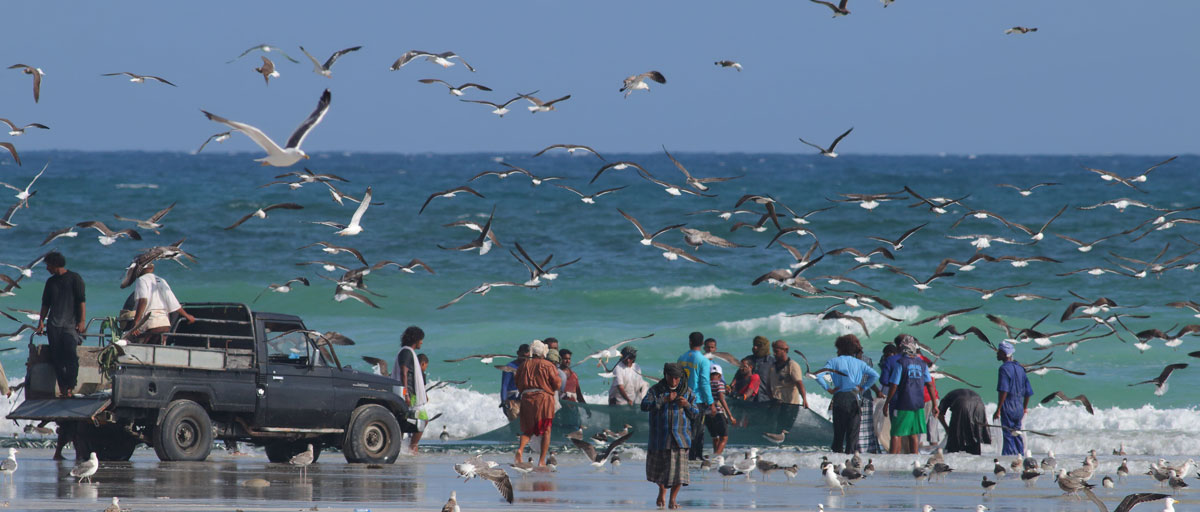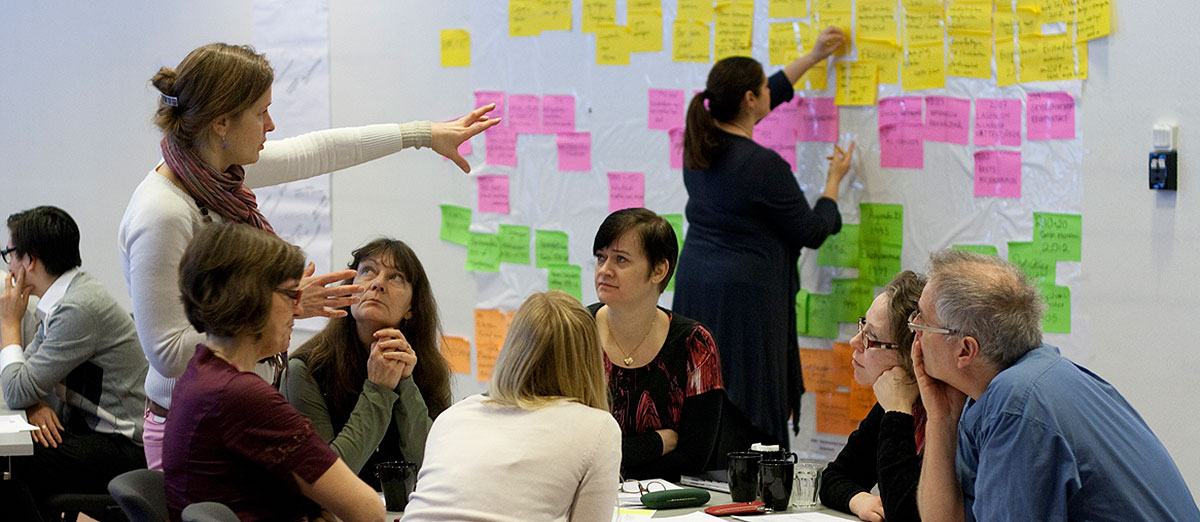PhD programme in Sustainability Science
Bildtext får vara max två rader text. Hela texten ska högerjusteras om den bara ska innehålla fotobyline! Photo: B. Christensen/Azote
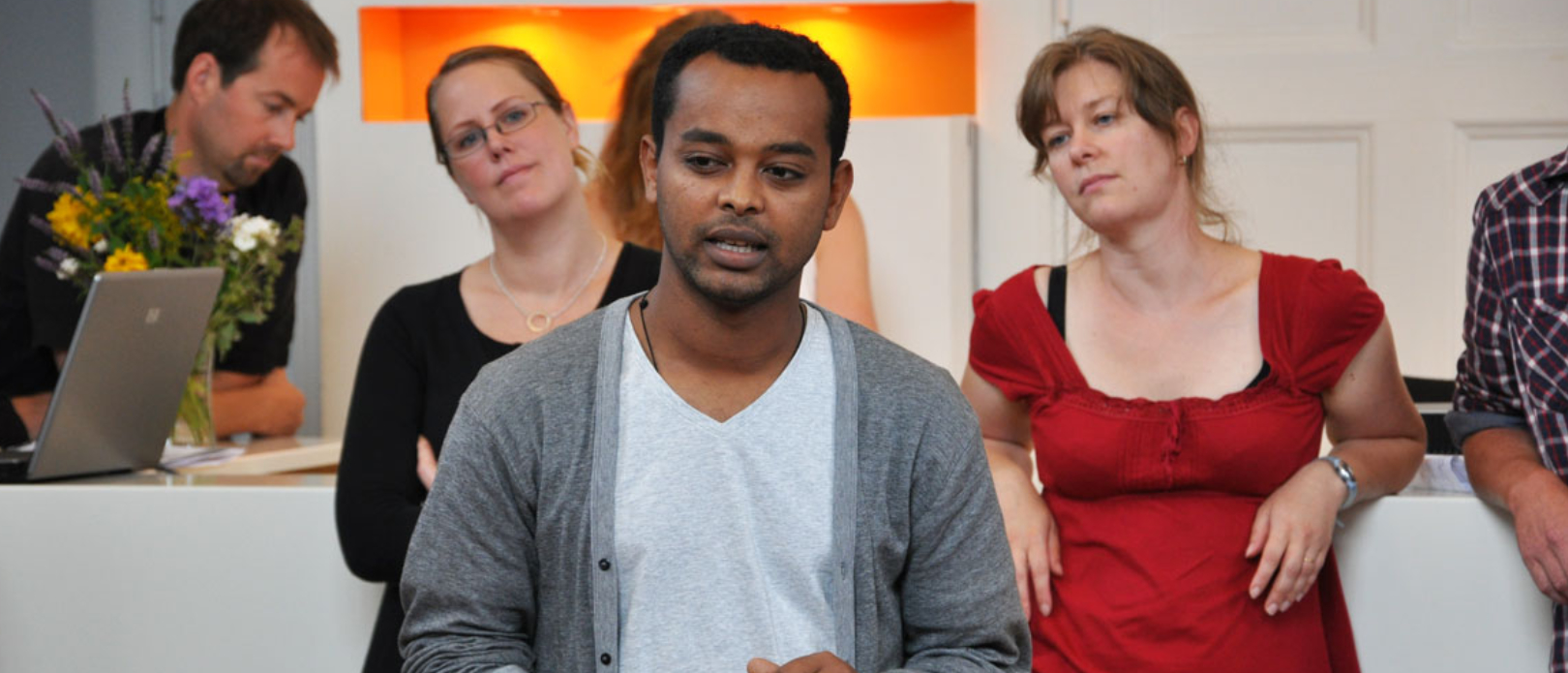
Our PhD programme develop researchers who can address the sustainability challenges of the Anthropocene
The SRC approaches sustainability science from the perspectives of complexity and social-ecological interactions in the Anthropocene, a new and novel global epoch in which the social and the ecological are intertwined. Based on this there are three key core propositions that provide the foundation for Stockholm Resilience Centre (SRC) research:
1. People are part of the biosphere
2. People and nature are intertwined within integrated social-ecological systems
3. People need to respond to, engage with, and purposefully shape the biosphere to develop a sustainable future.
We aim to produce researchers who understand this area of sustainability science and have expert knowledge within a specific problem domain.
How to make it as a PhD student: Recently graduated centre share their experiences
Core knowledge
The sustainability challenges of the Anthropocene require a transdisciplinary approach to science. We expect that students will develop usable knowledge, but not mastery, across the SRC’s key knowledge domains: complex adaptive systems, social-ecological systems, cross-scale dynamics, diversity, transformations and biosphere-based sustainability. The relative emphasis within these domains will of course vary among students.
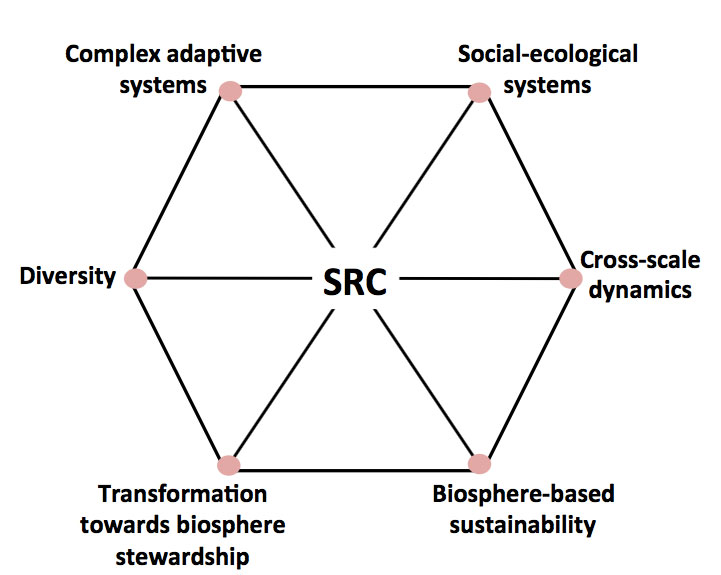
SRC’s core knowledge domains
Each of the six knowledge areas of the SRC embraces multiple conceptual frameworks, research questions, methods, and data. They are:
Resilience: the ability of a system to cope with change and continue to develop while maintaining its identity. Key concepts: systems-thinking, complex adaptive systems, regime-shifts, thresholds, feedbacks, adaptive cycle, panarchy
Social-Ecological Systems: linked system of people and ecosystems that emphasizes that people are part of nature and that the divide between social and ecological systems is arbitrary. Key concepts: agency, institutions, ecosystem services, ecological engineering, human ecology, ecological economics, mental models, social-ecological memory, and social-ecological learning.
Cross-scale dynamics: interactions across different scales, for example, between agricultural fields and monsoon dynamics, or between a neighbourhood and a city. Key concepts: connectivity, nestedness, hierarchy theory, panarchy, tele-couplings and tele-connections
Diversity: the variety, disparity and relative frequency of system elements. Key concepts: biological diversity, heterogeneity, modularity, functional diversity, response diversity, institutional diversity, polycentric governance
Transformation: a purposefully intiated reorganization of a social-ecological system. Key concepts: agency, opportunity context, transition theory, panarchy, adaptive governance.
Biosphere-based sustainability: a civilization in which humanity and the biosphere mutually support one another. Key concepts: challenges of sustainability, history of sustainability, Sustainable Development Goals, planetary boundaries.
Developing these competencies is expected to primarily occur through the practice of research by PhD students, guided and mentored by their supervisory committee. The development of these competencies is also supported by a set of PhD courses (for more info see below). The SRC also offers a varied annual stream of formal and informal seminars, events, and mentorship opportunities to help PhD students develop their core competences in concepts, methods, and analysis at the intersection of the social and ecological sciences.
The SRC has a special, productive, supportive research culture that relies upon four core research values: sharing, inclusiveness, respect and contributing to the common good.
Core Skills & Core Methodologies
The Core Skills & Core Methodologies of the SRC research school serve as a guide to map and discuss competence development of PhD students. Because students are working on different projects and have different goals it is unlikely that any two PhD students will have or wish to develop the same competencies. However, we expect all SRC PhD students to be at least “somewhat acquainted” (green zone) with all skills and methodologies presented below.
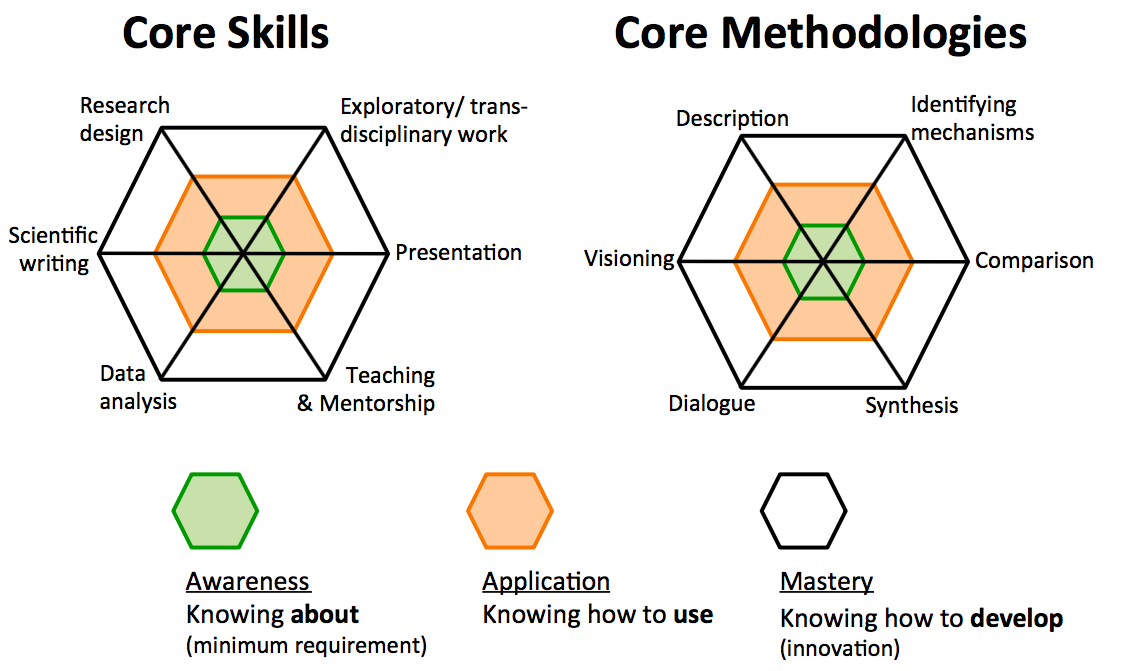
Core Skills are skills that SRC doctoral students should develop during SRC ‘s PhD programme. Many of these skills would apply to most PhD students, but at the SRC there is more emphasis on skills important to our synthetic and trans-disciplinary research environment.
These skills are:
- Research design: how develop research questions and identify methods and data that are able to answer those questions.
- Data analysis: how to use analytical methods to reliably and effectively address research questions. Includes issues of coding, statistical and non-statistical analysis, such as grounded theory.
- Scientific writing: being able to write scientific papers, being able to identify target journals, being able to write different types of papers (data-based, synthesis, reviews, policy/opinions), being able to write grant proposals, being able to write popular science.
- Teaching & mentorship: being able to build and give lectures, being able to supervise and mentor (e.g. master students, traineeships).
- Presentations: how to effectively communicate verbally, visually, and dramatically with different scientific, policy, and public audiences.
- Exploratory/Transdisciplinary practice: how to manage ethics, balancing practical vs. scientific demands, and conflicting goals, and world-views that occur in trans-disciplinary practice, how to build collaborative networks, designing workshops, facilitating and moderating dialogues, running participatory processes.
Core Methodologies are broad categories of methodological approaches that SRC doctoral students should develop an awareness of during SRC ‘s PhD programme. Some of these methodologies are covered in the required PhD courses, while others of these methodologies are expected to be developed during by the PhD student and their supervisory team during their PhD.
We have organized methodological approaches into six broad categories each of which will be developed differently depending on student PhD goals and research.
These groups are:
- Descriptive: how to characterize key structures, flows, interactions, changes over time, networks, patterns
- Identifying mechanisms: identifying causal relationships, drivers of change, feedbacks, key interactions, systemic causation
- Visioning: forecasting or projecting future dynamics, constructing scenarios, using visions as catalyst for action, narratives and their problems
- Dialogue: using dialogue to bridge multiple knowledge systems, participatory methods, participatory modeling, facilitation, adaptive management
- Comparison: comparing alternative methods, case studies, models to one another, and constructing null models; statistics and non-statistical contrasts
- Synthesis: how to generalize and construct new compressed understanding from diverse and disparate knowledge and data. Especially with focus on integrating across social and biophysical knowledge domains.
Core research values
The SRC has a special, productive, supportive research culture that is a key element of our success, and this culture relies upon four core research values:
- Sharing: sharing of ideas and insights with fellow colleagues to maintain an open and creative atmosphere.
- Inclusive: Collaborate rather than exclude, to find common grounds and novel insights.
- Respect: respect for individuals and others’ ideas (intellectual property right). This is imperative for maintain a sharing and inclusive environment. Respect the diversity of research being conducted, which contributes to the progress and success of SRC.
- Common good: Actively contribute to make the SRC working environment great by helping maintain the physical commons of the SRC, but even more so contributing to making the SRC a fun, exciting, and vibrant place to work and meet people.
How to apply for a PhD position
PhD students are accepted to the SRC’s PhD programme in Sustainability Science when they are hired for a funded PhD position at the centre. These positions are usually highly competitive and multiple candidates are interviewed for each position. On average we hire about fivePhD students per year.
We announce PhD positions four times per year.
These positions are advertised here.
PhD positions are usually funded from grants to SRC researchers. To discover if researchers whose work you find interesting are planning to offer PhD positions in the future you should contact them directly.
PhDs students are typically employed for four years. Salaries start at about 29 700 sek/month. This is about 31220 Euros/yr but may vary with exchange rate.
At SRC, as part of our transdisciplinary approach to training and research, we encourage students to work 20% (paid) on other SRC projects, which extends their PhD employment to five years of 80% PhD employment. This work is not required and indeed is not guaranteed for all students. However it provides students with experience that complements their research work. Students generally work with other SRC projects such as GRAID, SWEDBIO, Albeco, or help organizing various conferences or workshops.
Further information
How to make it as a PhD student: Recently graduated centre share their experiences
For further questions, please contact Garry Peterson, head of subject in sustainability science, garry.peterson@su.se
We announce PhD positions four times per year. For 2023 the periods are:
16 January - 5 February
2 - 23 April
20 August - 10 September
15 October - 5 November
Please note that if no announcement is made, no posititions are made available for the specific period.
How to apply to a PhD position
How to make it as a PhD student: Recently graduated centre share their experiences
For more information about PhD studies, please contact:
Victor Galaz, Director of the PhD research programme
Örjan Bodin, head of subject in sustainability science
Patricia Villarrubia Gomez, chairperson of the PhD student group

